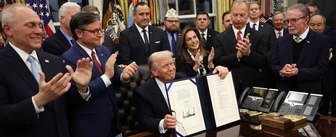As COVID-19 continues to spread, few expect that the pandemic will end any time soon. In the latest Economist/YouGov Poll, 57% of Americans either say they believe the pandemic won’t end before 2023 (31%) or say it will never end (26%).
That figure, while high, is a decline from some earlier polls this year. The public becomes slightly more optimistic as cases decline and a little more pessimistic as cases rise, though as the pandemic wears on the rise and fall of the latest wave appears to have diminishing effects on long-term expectations.
Political party as is often the case, has an effect here: 17% of Republicans and 14% of Independents believe the pandemic is already over, compared to just 2% of Democrats.
Most Americans believe the pandemic is still with us and will remain with us for a year or more. Despite its perceived persistence, many say that over the last few months they haven’t been taking all of the precautions they did during the first few months of the pandemic. One in three Americans say they are social distancing less, and the same proportion say they are wearing masks less frequently. But one pandemic behavior has stuck with more Americans: Just 12% say they are washing their hands less often.
While half of Americans claim to wash their hands at least six times a day, women say they wash their hands far more often than men do. More than twice the share of women than men (24% to 11%) say they wash their hands 10 times or more a day; more than twice the share of men than women (23% to 9%) say they wash their hands less than three times each day. The typical man says he washes his hands between three and five times each day, while the typical woman says she washes hers six to to times each day. (Women were reporting more frequent hand-washing than men before the pandemic, too.)
There’s no real difference by political party on self-reported hand-washing. Half of Democrats, 47% of Independents, and 45% of Republicans say they wash their hands six times or more each day.
In this week’s poll, the same share of Republicans, Democrats, and Independents report being personally affected by the pandemic. One in 10 of each group say they have tested positive for the virus. At least 60% of each group has a close friend or family member who has received a positive test result.
Most Republicans say they oppose all types of mask and vaccine mandates polled. Only about one in four Republicans favors vaccine mandates for police officers or firefighters – mandates that several large cities with Democratic mayors have adopted, including New York. And one in four Republicans support mask mandates for K-12 students, though slightly more, 31%, would allow colleges and universities to mandate masks for their students.
Large majorities of Democrats support all those mandates, and more Independents do than don’t, although Independents are evenly divided on whether vaccine mandates for firefighters should exist and closely divided on allowing K-12 schools to impose them. Parents of children under 18 are somewhat more supportive of K-12 mandates. By a nearly two-to-one margin (57% to 32%), they say they believe schools should be able to impose mask mandates on students.
See the toplines and crosstabs from this Economist/YouGov Poll
Methodology: The Economist survey was conducted by YouGov using a nationally representative sample of 1,500 U.S. adult citizens interviewed online between October 30 and November 2, 2021. This sample was weighted according to gender, age, race, and education based on the 2018 American Community Survey, conducted by the U.S. Census Bureau, as well as 2016 and 2020 Presidential votes (or non-votes). Respondents were selected from YouGov’s opt-in panel to be representative of all U.S. citizens. The margin of error is approximately 3% for the overall sample.
Image: Getty









